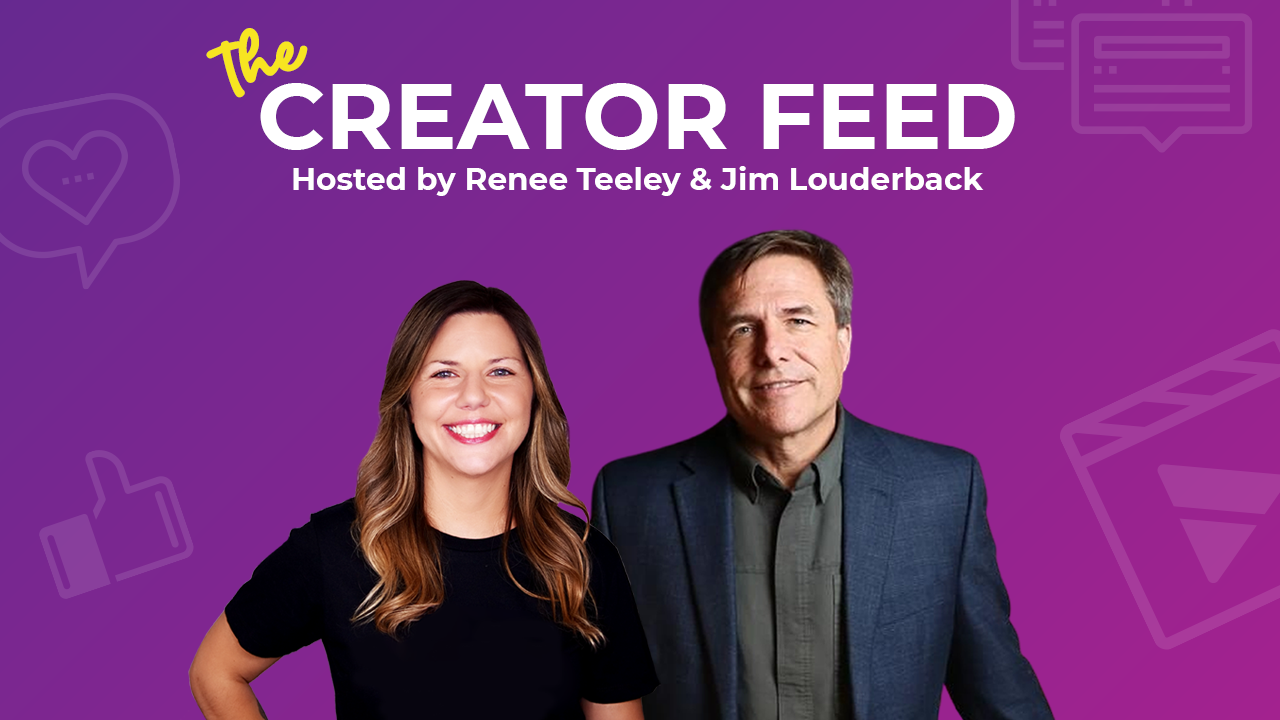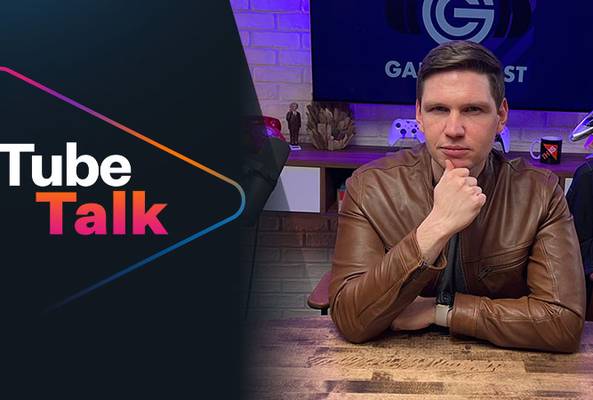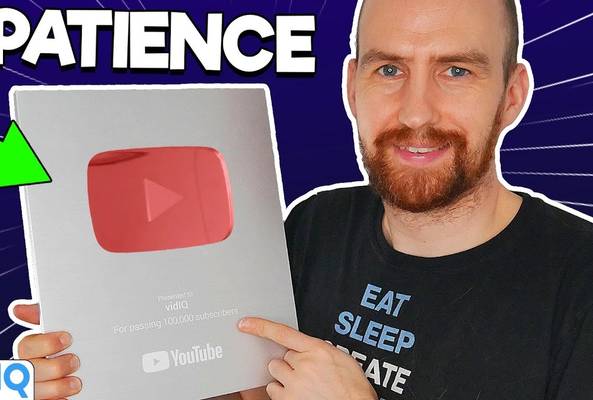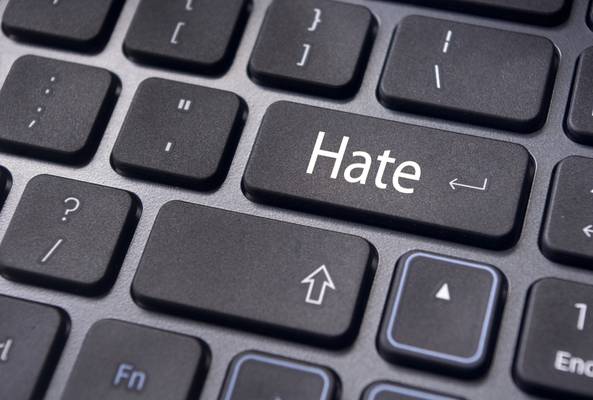Lydia Sweatt is a writer, bookworm, and bass guitar enthusiast. When she goes outside, a bicycle goes with her.
The Creator Feed Podcast: Why Learning the Creator Economy Is Worth it

New creators have a lot to learn when they join YouTube, TikTok, or any platform for the first time. For one, there's the task of turning random viewers into loyal, long-term fans. After that, making money from content becomes a real possibility.
What rarely makes the list, though, is understanding the creator economy, which is estimated to be worth $104.2 billion. After all, who has time to explore the vast content ecosystem? That means learning to thrive on multiple platforms, understanding all the money-making tools, and keeping up with industry news.
Which raises an important question: Is learning the creator economy worth it for everyone? Should it be required for every YouTuber, TikToker, or anyone building an audience?
Jim Louderback and Renee Teeley, co-hosts of The Creator Feed podcast, say, "No." Only certain types of creators need to go that far.
"If you just want to get noticed, have fun, and find a girlfriend or boyfriend, you don't need to follow the creator economy," Jim says. "But if you're planning to make a career out of community-first media, then the second thing you should do after posting your first video, podcast, or episode is subscribe to The Creator Feed."

Courtesy of The Creator Feed
The Creator Feed is a weekly show exploring industry news, trends, updates, and how all of it affects creators. For instance, when did TikTok become a search engine, and how can entrepreneurs leverage that perk? Will AI-generated art change the look and feel of YouTube thumbnails forever?
No matter the topic, Jim and Renee break down the major points, share insights, and advise creators on how to move forward.
They can do this because they're both content experts. Jim is the editor and publisher of Inside the Creator Economy, a weekly newsletter presenting news, strategy, and analysis on the creator economy, web3, and the metaverse. He's also the former general manager of VidCon.
Renee is a creator economy executive and the former senior vice president of Content and Community at TubeBuddy. She has helped creators and brands grow their businesses through video and is a longtime creator herself.
Want to explore the creator economy? Listen to The Creator Feed podcast on Apple, Spotify, or your favorite podcast platform. You can also read this fun interview with Renee and Jim to get acquainted with the show!
Q: Why did you start The Creator Feed podcast? What's your ultimate goal?
Jim: We had nothing better to do at the time. No, seriously, there was a gap in the market between more interview shows and pure tip shows. We wanted to fill it.
We cover the mix of creator business news, advice, and insights for those who are higher-end or professional creators. We're great for people who aspire to make a career out of it, as well as the Creator Economy Curious (CEC). But really, professional creators are our target.
Q: Have you seen creators directly benefit from following news in the creator economy? If so, how?
Renee: Absolutely. Many creators are building businesses and offering products and services to help others. Following news and trends can highlight gaps in the market.
For example, Paddy Galloway noticed a market gap for creator resources and developed a job site for YouTube creators called YT Jobs.
Q: There are so many places to make and monetize content. How can people learn about the creator economy without feeling overwhelmed?
Jim: Start small. Listen to our podcast. Read my newsletter. Follow some smart folks on Twitter and LinkedIn. Go to some events like VidCon or VidSummit.
But in the end, make a bunch of content, experiment, and find out what works for you. We have ideas, but no one has the answers to every question. And every creator is different.
Q: On your podcast, how do you determine which news is most important to share with creators?
Jim: I talk about what I think is most interesting, important, and strategic. Or who I want to make fun of that week. Depends on the mood.
Renee: Same as Jim. I try to pick stories that will impact creators. I especially like discussing complex topics to provide some clarity or at least our opinion on what it means for the industry long term.
Q: For each piece of news, you share the pros and cons creators could face. It's very balanced and honest. What guides your process?
Jim: Be honest, and be beholden to no one. I worked off and on in corporate America for most of my career and found that it's hard to say what you think at a big company. My paycheck — or lack thereof — is not determined by any company, platform, or creator. It's freeing and fun.
Renee: Same! We're having honest conversations about the creator economy — the good and the bad.
Q: Speaking of pros and cons, creators have mixed emotions about how YouTube will monetize Shorts in 2023 — requiring 1,000 subscribers and 10 million Shorts views in 90 days. What's your take?
Renee: Opening up revenue share for YouTube Shorts is a positive move for the industry. It puts pressure on other platforms to figure out more sustainable monetization options.
However, YouTube hasn't been direct about the amount of money going to creators. YouTube stated, "From the overall amount allocated to creators, they will keep 45% of the revenue."
What is the allocated amount? Are creators receiving 45% of the total ad revenue or just a portion of the money coming in from advertising?
Also, 10 million Shorts views in 90 days is still challenging for many new creators. I'd like to see that number come down, so the average creator has a path into the YouTube Partner Program within six months.
Q: You've both built businesses in the creator economy. What's the hardest part about going from creator to entrepreneur?
Jim: Well, I'm sort of going the other way. I wrote for top computer magazines and newspapers and hosted a TV show on TechTV in the late '90s and early '00s, but then I didn't do anything for 15 years. Now I'm leaning back into my creator roots in the world of no gatekeepers. So far, it's not hard. It's more freeing.
Renee: I'm sort of going the other way as well. I started my career helping brands and creators with tech solutions. Then shifted to creating content that empowers creators and brands to grow their communities and build their businesses using video.
I'm doubling down on content this year. Not only does it help others, but I also love the creative process. Our podcast can help creators navigate the creator economy and think about their content strategically as a business.
Q: Have you noticed any traits of successful digital entrepreneurs?
Jim: Being able to do the hustle. It also helps if you can find your niche, build a company, and have fun along the way. I'm not sure there's a correct path, but I prefer the latter.
Renee: There are many paths to success, but it's a lot more fun to build a company if you love the product and the team.
Q: What makes The Creator Feed stand out from other podcasts?
Jim: I think the background of our cover art for the podcast is really popping. That helps us stand out. Plus, Renee's picture is great.
Renee: What helps us stand out is our commentary and perspective based on years of experience in the industry. Plus, Jim's picture is great.
Q: What can creators expect to learn in future podcast episodes?
Jim: Whether AI-generative art, text, and voice can actually replace podcasters anytime soon. Spoiler alert: The answer is no. But we'll keep working on it.
Renee: What Jim really thinks of the MrBeast Burger.


